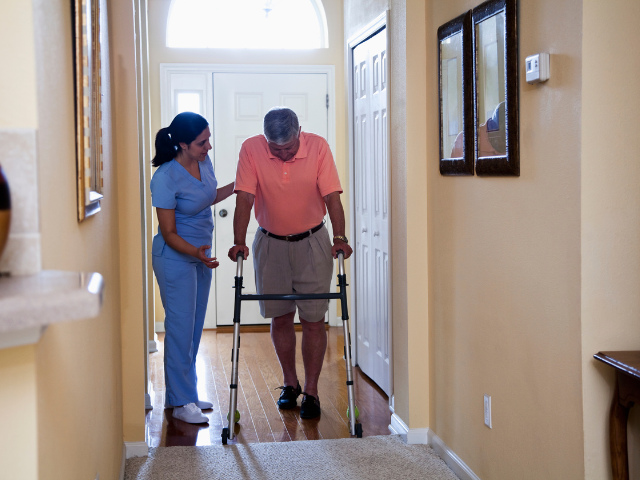Truly Getting to Know a Patient in Home Health
While caring for my patients outside of their homes, I learned about their support systems, home environment, and potential barriers to following physician orders.
Seeing a patient at home also allowed me to assess what additional home care services would be necessary. I would inform the doctor if I felt they could benefit from in-home physical therapy and a home health aide to help with activities of daily living (ADLs).
I loved clearly understanding a patient in both settings, which helped me deliver the best care. I quickly learned most aging patients want to stay in their home environment, and I would be happy if I could help them do that safely.
Realistic Patient Goals
I’m happy to report that most of my home visits were pleasant.
Seeing patients in their homes involves physical assessment and the ability to learn about their support systems or lack thereof. A home health nurse should assess safety and nutritional issues and help make the patient’s home environment conducive to healing.
However, over time, it became clear that goals for one patient were not always suitable for another patient with a similar diagnosis.
In the hospital, most patients follow the doctor’s orders — taking specific medications, following a special diet, going for tests, and participating in physical therapy.
Eventually, the patient would be discharged home with a list of medications, follow-up appointments, and instructions on managing new diagnoses, which often included dietary restrictions. Fortunately, patients did not usually dispute these instructions. Once a family or friend arrived to take them home, they agreed and quickly signed their discharge papers.
Most were excited to be going home!
If a physician had ordered home health services for a patient, I might be the nurse seeing them in their home if the visit was in my assigned territory.
However, I quickly learned that the patient I knew in the hospital might be less agreeable in their home.
For instance, they would sometimes refuse to take a particular medication because of the frequent trips to the bathroom or the adverse side effects they learned about. Another patient might admit they wouldn’t follow a specific diet because family dinner on Sunday was vital to them. They didn’t want to change what they ate and drank for the last 40-50 years.
I explained the importance of following what the doctor had ordered and how it would benefit their health. Eventually, they might agree to all or some of the instructions.
Of course, I’d call the doctor to let them know if the patient was not compliant with their orders. The doctor would see the patient in the next few days and revisit the conversation.
What I Learned from my Patients
Long after graduating from nursing school, I never stopped learning. I learned how to best communicate with patients, family members, doctors, and peers. I recognized that being flexible was vital in an always-changing work environment.
I improved my critical thinking, attention to detail, and assessment skills as I grew to understand the human body and disease processes better. I learned how medications worked and an ongoing list of new medical devices and necessary procedures.
But one of the biggest lessons I learned was that it is ultimately the patient’s decision how they manage their health. Most did not want to give up their independence and activities that brought them joy just because of something the doctor ordered — even if it did help improve their health.
Of course, to help the patient understand the importance of doctor’s orders, I would talk to their caregivers. They would agree to continue educating the patient about the importance of following the doctor’s instructions.









